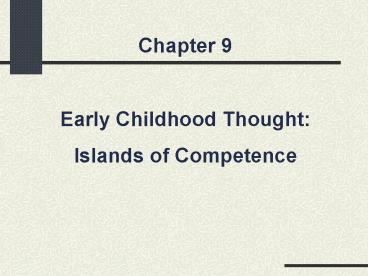Early Childhood Thought: PowerPoint PPT Presentation
Title: Early Childhood Thought:
1
Chapter 9 Early Childhood Thought Islands of
Competence
2
Piagets Account of Mental Development in Early
Childhood
- Infancy was focused on sensorimotor on the
physical - Preoperational stage - before age 7
- use 1 sided thinking, can only focus their
attention on one aspect at a time - By age 7-8 they are capable of mental operations
- coordinate 2 perspectives at the same time
3
Lack of Spatial Perspective Taking
4
Egocentric Speech
5
Confusing Appearance Reality
Young children focus on surface appearance They
way things seem rather than the way they
are Shown cross-culturally
6
Precausal Reasoning
- Young children cant engage in cause effect
reasoning by deduction or induction procedures. - They think Transductively drawing cause
effect conclusions from one particular to another
7
Effective Causal Reasoning
Children as young as 3 understood the cause of
the effect but could not give explanation Almost
all 5 yr olds could provide some explanation
8
Information-Processing Approaches
- Digital Computer
- Environmental Input
- Sensory Register
- Short-Term Memory
- Long-Term Memory
9
Framework Explanations
- Environmental Learning
- As children have more experience there is a
qualitative shift in their task engagement - Biological Maturation
- Immaturity of the young brain explains
limitations - Unevenness is due to different rates of
myelination and dendrite growth - Cultural Contextual through the use of Scripts
- Culture arranges activities, their frequency, the
purpose of those activities, the childs role
10
Biological Accounts
- Modality Theory
- Innate separate systems that do not need
special teaching in order to develop, only need
to be triggered by the environment
PowerShow.com is a leading presentation sharing website. It has millions of presentations already uploaded and available with 1,000s more being uploaded by its users every day. Whatever your area of interest, here you’ll be able to find and view presentations you’ll love and possibly download. And, best of all, it is completely free and easy to use.
You might even have a presentation you’d like to share with others. If so, just upload it to PowerShow.com. We’ll convert it to an HTML5 slideshow that includes all the media types you’ve already added: audio, video, music, pictures, animations and transition effects. Then you can share it with your target audience as well as PowerShow.com’s millions of monthly visitors. And, again, it’s all free.
About the Developers
PowerShow.com is brought to you by CrystalGraphics, the award-winning developer and market-leading publisher of rich-media enhancement products for presentations. Our product offerings include millions of PowerPoint templates, diagrams, animated 3D characters and more.

